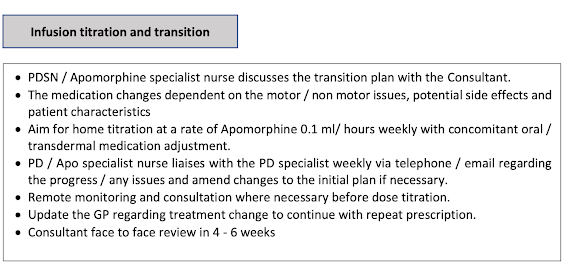Creutzfeldt-Jakob disease (CJD)
Creutzfeldt-Jakob disease (CJD) Case Report (Published Geriatric Medicine, UK Nov 2018) Authors Rachel Bennett – Advanced Nurse Practitioner, Sherwood Forest Hospitals NHS Foundation Trust Dr Slavka Ulikova – Specialty Doctor in Geriatric, Sherwood Forest Hospitals NHS Foundation Trust Dr Nishantha Silva – Consultant Physician and Geriatrician, Clinical Lead for Parkinson’s Disease, Sherwood Forest Hospitals NHS Foundation Trust; Nishantha.silva@nhs.net Introduction. Creutzfeldt-Jakob disease (CJD) is a human prion disease that exists in four forms; that of sporadic, genetic, iatrogenic and variant (Knight 2006). Human prion diseases share common neuropathological features such as spongiform degeneration, astrocytic gliosis and neuronal loss associated with amyloid plaques (Will & Ironside 2017). The prion protein is a cellular protein that changes through an unknown mechanism from its normal structure (PrPc) to PrPsc which is insoluble, resista...













Dr Silva, please can you let me know if this treatment is an option for patients with advanced Dystonic tremors? It’s affecting my mum badly now, the DBS is giving little relief. My email is natasharenshaw7@outlook.com if you could offer any advice it would be greatly appreciated.
ReplyDelete
ReplyDeleteHello - My wife is a 52yr old W/F who has been diagnosed with SPG7 (Hereditary Spastic Parapelegia Type 7), which affects the muscles in her lower extremities with regard to gait and balance. Interestingly enough, her paternal aunt and next eldest sibling both have the same diagnosis. Her aunt is getting around well, uses ski poles/canes to help her with her mobility. Her sister passed away at age 55 from heart complications, but led a more sedentary lifestyle due to her diagnosis and was content using a wheelchair. My wife is closer to her aunt's status as she is active and wants to retain her mobility. In my wife's situation, it appears around the time of the birth of her fifth child (2007) and some pretty stressful circumstances with child custody involving children from previous marriages, her symptoms pretty much came out of nowhere. She was 36 yrs of age, and she has slowly gotten worse over the years.
In reading the story regarding the PD patient, it seems to describe some of my wife's most recognizable symptoms (muscle spasticity, shakes, and general weakness). We have had some appts. with Dr. McMakin who practices in Frequency Specific Microcurrent (FSM), in Troutdale, OR and during our initial visit, she went over her genetic test results that identified the SPG7 diagnosis. She identified my wife maintained a heterozygous genotype and concluded her condition has to do with one gene in the gene pair having been switched on or off. She worked my wife thru some FSM therapies and was able to reduce the spasticity some and start the communication process from the brain. Her results were promising, as she began sleeping better, experienced a more steady urinary flow, and felt less fatigued. Because of the short term results observed during our visits, we purchased a Custom Care Unit Dr. McMakin programmed with frequencies she deemed showed the best results. Our visit was in June, 2023, and since then things were steady until the unit malfunctioned and needed to be sent in for repairs. We were without it for approx 4wks, and as such, my wife seemed to have regressed some. Unfortunately, since we have gotten it back (at least 5wks ago), she is struggling to regain the ground she lost. She is more tired now, walking worse with a few falls in between so we continually search alternative therapies in hopes to find something that can do a little more than what we're already doing.
Because of the story's content, I thought I would share her situation to see if there is anything your facility, or practicioners you are acquainted with might be able to help with. Any info or gene therapy treatment ideas that might be helpful would be greatly appreciated as the Neurologist advises there is no cure and prescribes her Baclofen for muscle relaxation. Should there be any studies your facility is involved with that she could fit into, we would certainly take that into consideration as well.
Thank you in advance for any information you are able to provide.
Respectfully,
Raymond (crr3martinijr@hotmail.com)
I want to talk with you
ReplyDeleteSend me your number
ReplyDeleteDear Dr. Could you please advise me on communicating with you and consultation for one of my friends treatment. He has been suffering from this Parkinson since 4 years. Could you please advise me a communication method? jabirnaleemi@gmail.com, ±94773600566 WhatsApp
ReplyDeleteHello, I want to talk to Dr. Silva. My sister has parkinson and I have a lot of interest to know about the treatment. Could you write me by email rosmon01@hotmail.com
ReplyDeleteNishantha aiya I am nimali nangi amal ge oya padam karapu ape gedara amal ge nimali nangi I want to contact you how can I contact you if you don't mind send your what's no nishantha aiya sehere i will write my mailadress nimalidesilvag@gmai.com
ReplyDeleteNishantha aiya
ReplyDeleteCan you rember me
Your sister ' s class mate nimali nangi oya padam karapu ape with my brother did you rember me I want to talk with you I saw your post in y tube I can't write here my what's up no my mail adress nimalidesilvag@gmail.com Miriam aunty ge loinal uncle he duwa nimali nangi send me your what's up no I like to talk with you if you don't mind